This dogtag was discovered by Henry Mayer, Charles Barnes (son) contacted PacificWrecks Dog Tag and now the tag will be returned to the sons.
Henry Mayer, who discovered the tag recalls:
"I found the tag pair on 9 Oct 2000 on a low hill close to Twin Peaks out at Durand Drome. I believe I sent one tag to Pete Flahavin to trace while the other bits are stored both in PNG and Brisbane Australia. On top this hill is a 2.5 x 4 meter leveled tent site where Barnes would have been billeted along with Ezra Best whose tag was also found close by. The tags were found 2 meters below tent site along with: 1 cent coin (penny) U.S 1942 | 6 pence Australian coin 1916 | 1 x 2nd Lt bar | 1 x W.O. bar."
[Photo via Peter Flahavin.]
Dog Tags Returned
Myself my brother Ed and my mother Alfa and me. The dogtag but it's on the table, November 12, 2005. Mom will celebrate her 90th birthday in two weeks. Thank you again for all your kindness.Sons Charles Barnes, to whom the dog tag was returned adds:
"We grew up at the same address as on the dog tag: 549 Main Street, Logan, West Virginia. His unit was the "Bushmasters" [45th Infantry Division]. Our father didn't talk much about the war. He was a Lt. Colonel, Infantry and fought in New Guinea. Dad graduated from the ROTC program at West Virginia University in 1938 where he was the Cadet Colonel, Brigade Commander. He edited a newspaper in Staunton, Virginia until called to active duty.
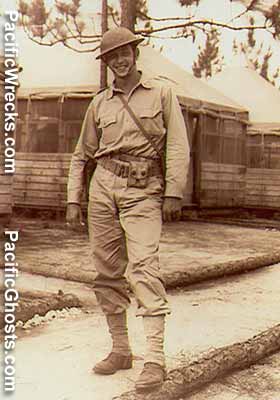 |
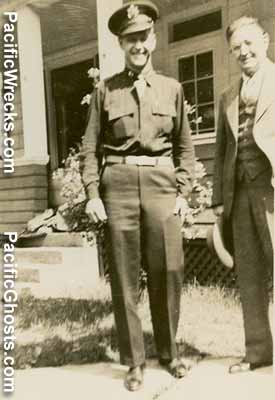 |
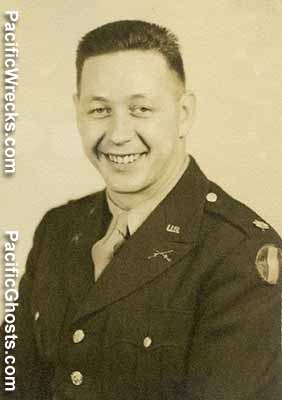 |
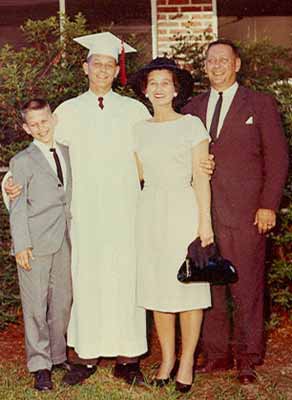 |
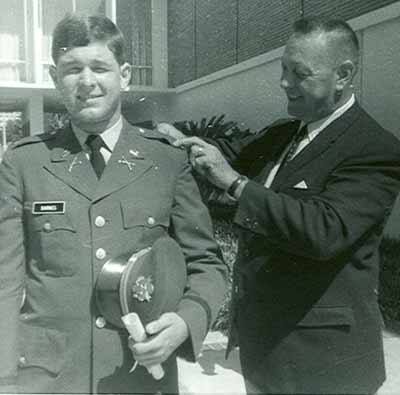 |
The 158th Regiment was detached and sent to the South Pacific via Panama. My dad was stationed in the Canal Zone as a jungle fighting expert! He told me when a particular unit left Panama for the Pacific, he was requested by name to accompany them - I'm assuming that was the 158th - 40th Infanty Division 'Bushmasters'. The timeframe (1943) fits exactly. I remember he told me that he was stationed at one time near an anti-aircraft battery that was operated by African-Americans. He spoke of being bombed by Japanese planes. I don't know if that helps you locate him in New Guinea. He spoke of having been to Australia (another berth of the 158th).
He and his unit were trapped behind Japanese lines for months, an experience which damaged his health and contributed to his death at age 70. My dad died on November 5th, 1987. We do know that he did not expect that he and his small band of men would survive. My brother and I have tried to figure out why only one of the dog tags was recovered. We have a theory that fits his personality. The tag lists his next of kin as his mother. He was extremely close to his mother, and she was in very poor health when he was in The Pacific. It would be very much like him to discard the dog tag that might lead to his mother being the first to be informed of his death. We do not know about any of his awards or citations, or any of the actions in which he was specifically involved.
Dad returned from the Pacific in late 1944. He was discharged in 1945 as a Lt. Colonel, Infantry. He married my mother, his college sweetheart, in January, 1945. He wanted marriage and a family right away; I was born at Ft Benning in 1946. I remember playing with his saucer hat. He would never talk about the fighting. He returned to our home town, a small coal-mining town in West Virginia, where he and his father owned a Desoto-Plymouth dealership. My brother Ed was born there in 1952. During this time both my mother and my father were especially active volunteers in Scouting.
My mother told me he contracted malaria, either in Panama or in the jungles of the Pacific. My brother talked about how dad would wake up in the middle of the night and go sit with a glass of cold water. He always seemed to fear not having water. He'd keep big bottles in the refrigerator. Apparently when they were trapped behind lines, they couldn't get fresh water. My brother said, "Every once in awhile, dad would come in and wake me up, and ask me if I would like to have a big glass of cold water. He used to say that nothing tastes quite as good as a glass of cold water.
After the coal economy collapsed in the late 1950s, dad moved the family to Tallahassee, Florida. He became the public relations director for a Federal savings & loan, and the family prospered. He and my mother were popular in the community; they were active in their church, she was a practicing pharmacist and he was a local celebrity, volunteering as the stadium announcer for Florida State Seminoles football games. He retired in 1979. The long term effects of his war service coupled with diabetes and the fact that he'd been a heavy smoker all contributed to his death in 1987. He was a man's man, even to the end. He knew he was dying but didn't reveal it; he fought hard against the gathering darkness. The morning of his death my mother and I had to go through his wallet. Like all diabetics, he had to carry a medical card giving instructions in case he fell unconscious. In bold hand he had written across the back: "If all else fails, try Scotch "He loved Shakespeare and opera, football and guns. He was a champion pistol shooter, amassing a glittery collection of trophies. Renown as a trick shot artist; he could balance a potato on the back of his gun hand, drop the potato, draw his pistol and put a bullet in the potato before it hit the ground. Police officers in his home town sought him out for marksmanship training, and he served a term as Mayor of Logan. All of his personal military records and papers were accidentally lost, in a records fire in 1973 that destroyed much of the DOD data for men his age."
Letters from Charles Barnes related to WWII
Charles Barnes' son shares some letters his father wrote about his WWII experiences:A letter to Charles Barnes, 1970 about deploying to the Pacific:
"I had served for well over a year in Panama with the 5th Infantry Division and we had been ordered home....Then, on the 11th of December, my birthday, the Commandant called to me to tell me that two officers had been requested, by name, to join a National Guard unit that was leaving Panama for the South Pacific... [the other fellow] was an adjutant specializing in paperwork, and the other - me - as a jungle fighting instructor. I reported to my new unit on December 20th and found it to be a real mess... For instance, I was given 183 men - all privates - and told to form a headquarters company with an anti-tank platoon and demolitions platoon in addition to my battalion headquarters group....On December 24th every officer in the entire outfit who was eligible for promotion received a step in grade, except for me, even though one condition of my transfer was that I be promoted to Captain immediately."A letter to Charles Barnes, 1971 about his combat experiences:
"I'll spare you the details and merely jump to a point in my life where it seemed by all logical reasoning that there was little chance for any of our group to come out alive; and it was then that I decided that my life was valuable enough to me to decide, in the time left to me, exactly what I was going to do with it. I admitted to myself and accepted the fact that I would probably be killed; and, it seems strange to me remembering all this, then decided it would be interesting in an academic sort of way to see how hard I could make it for them to do it.First of all, I decided that I would not be captured under any circumstances. I prefer the quick death in battle to the personal degradation and slow starvation which was about all we could expect from the enemy at that time. Secondly, I decided that I would not be outsmarted or booby-trapped through lack of security or caution on my part. That would make it too easy for them. My thinking was to estimate what they would do, and then avoid that circumstance as nearly as possible. The third thing I decided was to take whatever time was necessary to make certain that each shot was dead center on the target, no matter what was going on around me. I further decided that at no time would I be without a weapon, cocked and loaded. Around my neck on a string was a grenade, and always in my boot was a knife honed razor-sharp. There was one more thing. I decided that each moment and hour and day that I was allowed to live would be precious to me, and treasured as an opportunity to help other people and to do what I felt was the right and proper thing for a man to do.
Looking back it all seems so strange. There have been times since that I have been afraid for you or your mother or brother but not for myself. a man who has lived this long on borrowed time is not apt to be fearful of death when it comes, not to place too high a value on it if the alternative be contrary to what is right and proper. Forgive me for dwelling on this subject so long, but if in the narrative you should find some small thing to make the coming months more bearable in that frightful land, perhaps this re-hashing of ancient history might serve to point up the fact that you are not the first soldier to lie awake before the battle and envision the consequences of future action."